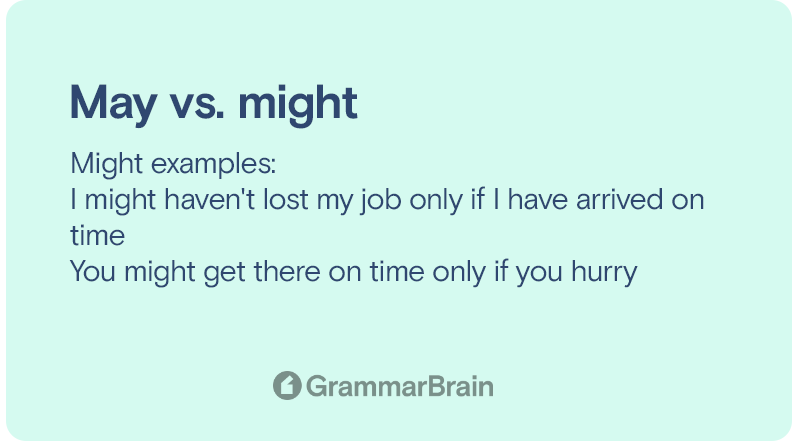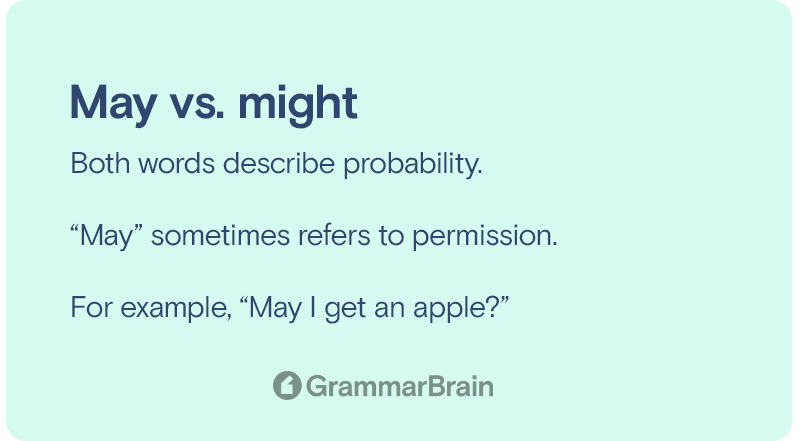Whats The Difference May Vs Might Basic English Grammar

Whats The Difference May Vs Might Basic English Grammar Classx What’s the difference: may vs might basic english grammar learn english with englishclass101 8.47m subscribers subscribe. Learn the difference between the words may and might and how to use each of them correctly in a sentence so your writing always looks polished.

May Vs Might Download Free Pdf Grammatical Tense Perfect Grammar And there you have it — a comprehensive guide to may versus might. remember, the key is in the nuance: may carries a sense of probability or permission, often more formal or certain, while might introduces a shade of doubt or lesser likelihood. Here’s the simplest way to think about it: “may” sounds more sure, while “might” sounds more doubtful. it’s all about how much you believe in the possibility. In this guide to “might vs may,” you’ll learn the real difference between the two—covering their meanings, usage rules, real life examples, and even common mistakes to avoid. 🚀 whether you're preparing for ielts, toefl, school exams, or just want to speak english fluently, this lesson will help you master modal verbs with ease! 👉 may or might?.

Difference Between May And Might In English Grammar In this guide to “might vs may,” you’ll learn the real difference between the two—covering their meanings, usage rules, real life examples, and even common mistakes to avoid. 🚀 whether you're preparing for ielts, toefl, school exams, or just want to speak english fluently, this lesson will help you master modal verbs with ease! 👉 may or might?. “may” suggests a greater likelihood of something happening, often used in more formal or present contexts. for example, “ you may start the exam now ” implies permission in the present. Choose "may" if you're asking for permission or indicating a real possibility based on present circumstances. choose "might" when you're suggesting a lower probability, discussing hypothetical scenarios, or future uncertainty. Mastering the use of “may” is crucial for polite conversation, but throwing “might” into the mix makes everything more complicated. when and where do you use each? correctly using “may” is an important lesson in politeness. While they’re sometimes interchangeable in casual contexts, “may” sounds more likely and formal, while “might” expresses uncertainty or refers to past possibilities.

May Vs Might Which To Use Grammar Examples Grammarbrain “may” suggests a greater likelihood of something happening, often used in more formal or present contexts. for example, “ you may start the exam now ” implies permission in the present. Choose "may" if you're asking for permission or indicating a real possibility based on present circumstances. choose "might" when you're suggesting a lower probability, discussing hypothetical scenarios, or future uncertainty. Mastering the use of “may” is crucial for polite conversation, but throwing “might” into the mix makes everything more complicated. when and where do you use each? correctly using “may” is an important lesson in politeness. While they’re sometimes interchangeable in casual contexts, “may” sounds more likely and formal, while “might” expresses uncertainty or refers to past possibilities.

May Vs Might Which To Use Grammar Examples Grammarbrain Mastering the use of “may” is crucial for polite conversation, but throwing “might” into the mix makes everything more complicated. when and where do you use each? correctly using “may” is an important lesson in politeness. While they’re sometimes interchangeable in casual contexts, “may” sounds more likely and formal, while “might” expresses uncertainty or refers to past possibilities.
Comments are closed.